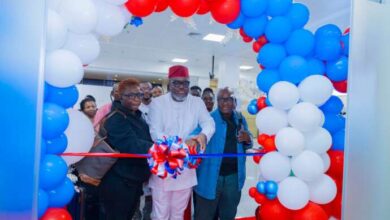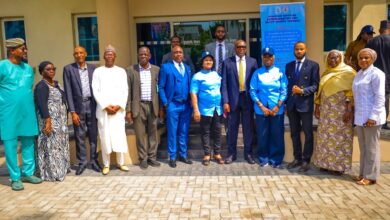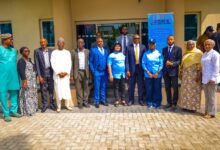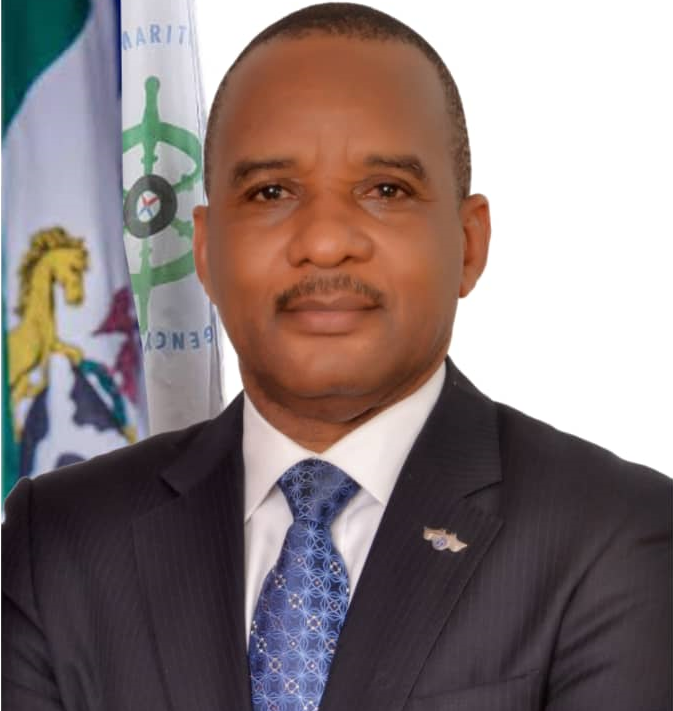
The Director General, Nigeria Maritime Administration and Safety Agency (NIMASA), Dr. Bashir Jamoh has said that the present administration is working towards disbursing the Cabotage Vessel Financing Fund (CVFF) to Nigerian shipowners in the region of $700 million before the end of its tenure on May 29, 2023.
According to him, each beneficiary (qualified shipowner) will get $25 million to acquire a vessel in order to boost the maritime sector and create jobs for Nigerians.
Jamoh made this known at the Maiden Annual lecture organised by the Institute of Maritime Studies (IMS), University of Lagos, on Tuesday while speaking on the theme: “From Crude to Blue – Nigeria’s Blue Economy: The Imperative of Maritime Domain Awareness and Good Governance”.
He explained that NIMASA would provide 50% of the funds, while the primary lending institutions are to come up with 35% and the shipowners, 15%.
Jamoh noted that the blue economy has the potential to solve the high unemployment rate in the country, especially with the oil glut in other parts of the world, which has affected Nigeria revenue generation, adding that issue of piracy threatening trade in the region has now been brought to a halt through the national maritime security initiative known as the Deep Blue Project.
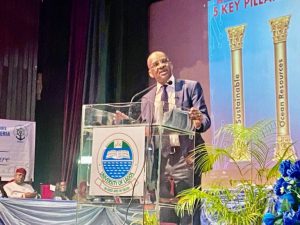
His words: “We are about to commence the disbursement of the CVFF, to allocate about $25m. $350 million is the 50% of NIMASA’s contribution to the fund. By the guidelines, the primary lending institutions will have to provide 35%, while the shipowners come up with 15%, making 50%. If we have $350 million as 50% contribution from NIMASA, then you are expecting another $350 million from the primary lending institutions and shipowners, making a total of $700 million.
“We will give an average of $25 million per vessel according to the guidelines and we have about $700 million for the CVFF. Our expectation is that each beneficiary will get not more than $25 million. This is for economic growth and to improve livelihood; the issue of jobs must be improved, as we are moving from crude to blue. Look at the sectors, how many jobs can the oil industry provide at this given period of time? Then you look at the maritime sector and the type of jobs they can provide.
“With the capacity of the ship, it can provide 71 direct jobs. When you divide 25 by 700, how many ships can you provide under the government’s guidance on ship financing? So you see the number of jobs the CVFF alone can provide. You can imagine if each ship produced 200 direct and indirect employment, the amount of jobs shipowners can provide. So, the issue of lack of employment in the country, definitely, blue will have to provide it, if we are serious.
“For some time it has been quiet, but we are not sleeping. We are in the last lap. We have consulted with the primary lending institutions and have engaged a consultant. It is out target that this loan will not be business as usual. We insisted that it must be one single digit loan. There are many grey areas like admistrative charges, tenure from the bank and others.
“This is what our consultant and the lending institutions are trying to harmonise and agree upon a position. Once the consultant submits the report, it will be passed to the supervising ministry. If they are comfortable with it and approve, the next thing is disbursement. So, I still believe and hope that we are going to disburse the fund before the end of this administration”.
On capacity development, he explained that NIMASA established the IMS in six universities across the six geographical zones of the country and a university in Okerenkoko, Delta State to enhance Nigeria’s capacity to exploit its share of the global blue economy valued at over $2.5 trillion.
Speaking further on the sideline of the event on maritime security, Jamoh revealed he met with some stakeholders in order to address the issue of marine cables.
He said: “We don’t want to be seen as a revenue generating agency because many people began to perceive that it’s the 3% fee that we want to pursue. Our emphasis is on safety and the possibility of hoodlums using marine cables to create chaos or damages under the water. We must know what cables are underneath the water, who owns the cables and where they are located. So, we are presently developing a guideline for marine cables.
“The NCC, the Ministry of Environment, and other stakeholders must be involved and we must have Environmental Impact Assessment (EIA) and guidelines. All necessary stakeholders are involved in the development of these guidelines and when we finish, we are going to involve the Ministry of Justice so that we don’t have any lacuna. The Federal Ministry of Transportation will also be a part of it”.
On his part, the Minister of State for Transportation, Prince Ademola Adegoroye echoed the position of Dr. Jamoh on the disbursement of the CVFF.
He said: “I can assure you that government will do everything that will make it easy for shipowners to get more ships, so that we can continue to grow out blue economy. It makes sense for any responsible government to do that. If it gets too expensive, then it becomes a problem even for our economy.
“We are hoping and praying that the CVFF will be disbursed within the next eight weeks, but if it doesn’t work, we also expect that because government is a continuum, the incoming government, which is also an APC government will continue from where we have stopped”.
Also speaking, the Vice Chancellor of UNILAG, Prof. Folashade Ogunsola disclosed that the the Institute of Maritime Studies has produced a total of 180 graduates since it was established in 2013 to address the shortage of personnel in the sector.
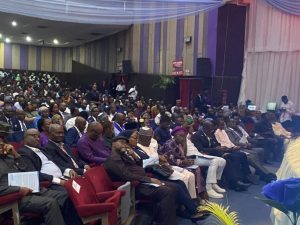
According to her, the institute which started with three courses has now increased to six, with 293 students currently registered in different programmes.
While pointing out some of the objectives of the the agreement between the institution and NIMASA, which is to develop academic and research capacity for the maritime industry; exchange of ideas, information and materials; academic exchange and training, collaborative researching among others, she said that the school is open to private sector partnerships that will help make the students industry ready.
On areas the institution will be prioritising after the lecture by Dr. Jamoh, she said: “We had a previous agenda that we were working on, but the University is very interested in manpower development. We are also seriously working on aquaculture and looking towards Marine Engineering.
“We are looking at all these areas and planning to expand. These are things that take a little while, but we think we have some advantages. Nigeria is blessed as a coastal nation and have a lot to benefit of we take advantage of the natural providence it has in the sea”.
The event also had in attendance, transport scholars, shipowners and other industry stakeholders.






